Human relations (HR) has always remained an essential part of any business. At first, the role of HR was majorly focused on hiring, staffing, and firing employees. However, with the advent of globalization, organizations have inclined more towards employee-centrism. This has broadened the horizons of HR, making it more than just a department looking after people.
Typically, the HR department is responsible for every aspect of employee management. This includes recruiting and hiring people, providing them training, managing their compensation and benefits, dealing with grievances, and a lot more.
Put simply; HR management is very comprehensive yet complicated.
Unfortunately, small to mid-sized scale businesses fall short of resources to establish a dedicated in-house HR department. Therefore, if your HR needs are surpassing your internal HR capabilities, the smart option is to outsource these HR functions.
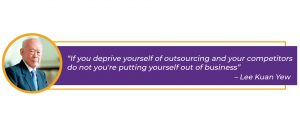

What HR Functions Can You Outsource?
There’s a rich profusion of benefits you can avail if you choose to outsource your HR functions. What’s best is the fact that you are allowed to outsource your entire HR work to a reliable agency, rather than having to externalize some and keep other functions in-house. The vast majority feel that they have the resources to manage some HR functions on their own, but that approach rarely works for the good. Outsourcing all the different elements of HR will ultimately save you a great deal of time and money that you can invest in growing your business.
Here we have highlighted some major HR functions that you can outsource to put your attention on more demanding issues:
Legal Compliance
The central role of HR is to ensure that your business always remains compliant with the labor laws. Moreover, HR also readily addresses any employee concerns and considers all reports they have seen in the workplace (for example, discrimination, harassment, or bullying).
Payroll Management
Contrary to popular belief, payroll management is a very comprehensive work. It starts from paying decent salaries to all employees, to calculating the times of hourly workers, withdrawing taxes from wages, statutory adjustments, and much more. HR professionals are required to know the total payroll costs of the company, where they factor in gross salaries, benefits, taxes, and insurance holdings for every employee. Then comes the important stage i.e. the production and distribution of payslips. Before the salaries are disbursed through bank transfers or cheques, the HR department provides every employee a payslip detailing their: gross pay, deductions, net pay, and hours invested for that pay period. Subsequent steps include making payments, filing reports on time, completing annual reports and tax reporting for the coming year, along with maintaining excellent records. In recent times, all these tasks have been simplified with the incorporation of technology; software solutions that provide automation and smart data connectivity to save time, are making a huge impact.
Managing the payrolls is the sole responsibility of HR. This job also ensures that the company is compliant with all the state and federal laws regarding employee payments. All the above-mentioned tasks are tedious and require extreme meticulation to avoid any major problems. It is only best that this job is outsourced to an expert company.
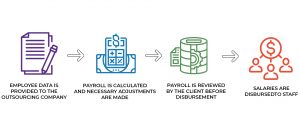

Grievances Handling
HR generally takes care of all of the employees’ compensation and claims. HR also holds the responsibility to look after the injured and sick employees, whether they are receiving the right medical care and are treated fairly by the company or not. Additionally, the HR department should also be very vigilant about renewals and audits to make sure that every policy is up-to-date.
Employee Allowances and Benefits
Whether we talk about basic health insurance, car allowances, fuel allowances, life insurance, or terminal benefits, all of this is handled by HR. All of this requires stringent paperwork, and it can only be done effectively by an expert in the field. HR managers have to handle open enrollment, renewals, offerings, terminations, benefits, along with yearly audits for every plan.
Staffing and Recruitment
This happens to be the most basic yet the most important function of HR. The department recruits new people for the vacant position. This particular job starts from advertising the position, gathering and going through all the resumes, scheduling interviews, and deciding who to hire. Contrary to popular belief, the job requires a lot of effort and time to be carried in an effective manner. Having your existing managers carry out these duties will only affect their productivity and their workload.
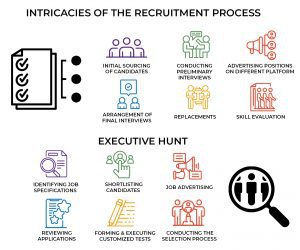

Employee Background Checks
After the recruitment process, HR goes through a thorough background check of the candidates, alongside the screening process for the job position they have applied for. Examples of screening and checks include drug tests, various physical tests, and background checks after the job offer has been made. Carrying out thorough background checks requires having dedicated resources in HR Department which comes at a cost. Adding on to the salaries expense, it also requires some paid tools and software to conduct necessary verification. All of these excessive costs can be avoided just by collaborating with an HR agency.
Skill Testing
If the job position requires technical skills, the company asks the job candidate to take a pre-employment skill test. This basically ensures that the employee is proficient in the skills necessary to perform the job. HR makes the candidates go through these tests when they have cleared the initial interviews. There are tons of examples where small businesses perform all the skill-testing and interviews with the support of external HR partners eliminating the need of having a dedicated HR department. Subsequently, their intake processes are very delayed and haphazard.
Training
Every business – whether it’s a small startup or a large-scale enterprise, ensures that their workplace is comfortable and safe for every single employee. This is why all employees undergo training after they have been hired. HR is solely responsible for carrying out these training workshops. For organizations that don’t have an HR, it becomes very tedious, challenging, and costly to conduct workshops and training sessions.
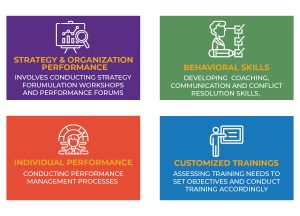

Now that we’ve discussed in detail the role of HR and its importance, let’s dive deep into the significant benefits you’ll enjoy if you choose to outsource the HR functions:
1. Cost Savings
A lot of companies underestimate the role and work of HR, and they end up creating a mess later on. It’s important to note that the cost of HR management rises high, especially if you take into account all the functions HR manages. To understand this better, the more employees you have, the more HR staff you will need. An increasing number of employees can turn into an issue here since you wouldn’t like your HR personnel to handle more than one function. To put this into perspective, if you make one HR employee handle recruitment, compliance, payroll management, and other functions, it will become a grave problem for them.
In modern times, HR has turned so complex that it requires a complete team with a different skillset to get the job done. Getting an entire HR team would only mean you have to pay each one of them their salaries along with the covered benefits, taxes, and compensation. Moreover, you will also need a larger workspace to accommodate everyone.
The HR function mostly does not generate a lot of revenue, which is why maintaining an in-house HR department requires great amount of resources. Conversely, if you choose to outsource this entire department, you’ll end up saving a substantial amount of money.


2. Better Payroll Management
When the business grows, and a larger number of people work for your company, you will most certainly need HR staff to look after the matters involving payroll. Having the HR staff to handle payroll services along with conflict management and other HR issues is putting too much on their plate.
It’s imperative to understand that payroll management is much more than just cutting checks. The process involves maintaining pay slips, holding records, making thorough analysis reports of accounting, giving employees the proper tax deduction advice, and several other responsibilities.
If you have your HR staff handle all these functions simultaneously, you will overburden them. Consequently, there will be a plethora of errors – and payroll errors are an awful thing to deal with.
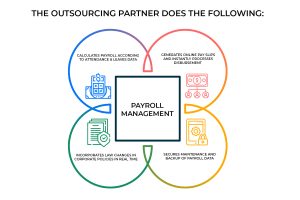

3. Cost Of Hiring More Employees
Now that we’ve already established the fact that shoving too many responsibilities on one person affects their performance, it brings us to a critical point here – the employee acquisition cost. With the business seeing growth, you will have to hire more HR personnel to take care of all the functions. Hiring HR staff will definitely become a burden on your wage budget when you factor in all the salaries, benefits, and equipment they will need to work. On the other hand, you can cut all these high costs by outsourcing HR functions.
4. Time-Saving
When you consider all the different functions HR is responsible for, you can only imagine the amount of paperwork and administrative responsibilities that will be attached to all these HR functions. All these tasks are extremely time-taking, and if you choose to do all of this internally, you will subsequently have to ignore other essential business functions. By outsourcing the HR functions, you will free up valuable time that your people can to grow business operations.
5. Better Monitoring Of Employees’ Performance
Although many companies require their managers to look after the performance and development of employees, this task can also be handed over to HR. It’s important to understand that micromanagement and handling apparently small matters can hinder the flow of work. An HR agency can provide you comprehensive reports on employees’ performances and whether they are complying with your company’s policies. This will also reduce the work pressure of your managers.
6. Improved Employee Benefits
When you work with a professional employer organization (PEO), you will get access to better health benefits for your employees. Generally, large enterprises get comprehensive coverage at better prices. However, a PEO can quickly provide small and mid-sized companies the type of coverage options that are typically available to larger corporations.
HR services in Pakistan are gaining immense importance and acknowledgment in recent times. Businesses have grown from the misconception that HR can be handled conveniently by managers or that a small department can get the job done. HR has acquired the position of a business partner in the current scenario, and it’s only making workplaces more accommodating. That said if you’re in search of reliable and top recruitment agencies in Pakistan, get in touch with People™. With over two decades of specialized experience, we have been working to build a value-based relationship with our clients by providing high-quality solutions for human resource management.


